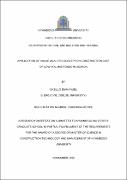| dc.description.abstract | The success of implementation of highway infrastructure projects is usually measured against three parameters; quality, time and cost. However, some of these projects do not achieve expected project goals in terms of quality. Secondly, project delivery is not within a reasonable amount of time, and finally, costs are not in line with their budget limits. This study applied Value Analysis (VA) methodology in the construction of Low Volume Roads (LVRs) in Uganda, to mitigate the aspects of time and cost but still ensuring that the functionality and quality aspects are not jeopardized, through the generation of innovative alternatives.
The methodology included document review and cost analysis of LVR projects previously implemented in ten districts in Northern and Eastern Uganda. In this study VA technique involved the employment of a composite or mixed method of work, incorporating both mechanization and manual labour during the Road Formation Phase (RFP), as opposed to the existing labour based methods. The VA technique was applied to two construction projects, that is: the construction of 800 meters of LVR in Financial Year (FY) 2017/18 in Kole District which project was undertaken by the researcher and during the construction of a 1,200 meter LVR in Bukedea District in the same year.
Comparison of the cost when the VA is used, with the current cost through hypothesis testing was done, and the alternative hypothesis that the cost reduces on application of the mixed method VA technique during the Road Formation Phase (RFP) was upheld at 95% confidence level. It was established that average cost per metre of LVR when using the conventional labour methods was UGX. 250,000, while an average cost per metre of UGX. 228,157 was achieved when the mixed method approach was used, thereby realizing an 8.7% reduction in the average cost per metre of the construction of LVRs.
The researcher thus concluded that the cost of LVR construction significantly reduces when VA is applied during the RFP. The researcher recommended the use of the mixed method VA technique for the ongoing and future LVR construction projects under the Low Cost Seal (LCS) Program and proposed that further research should be done to apply VA on the sealing phase of LVR construction.
Key Words:
Value Analysis, Cost per Metre, Mixed Method, Road Formation Phase, Low Volume Roads, Low Cost Seal. | en_US |

